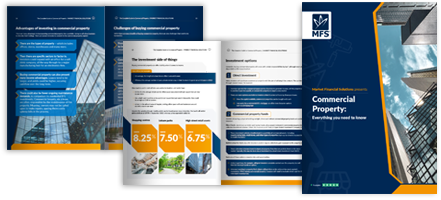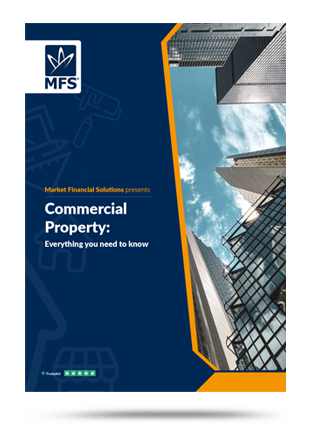Disclaimer
Market Financial Solutions are a bridging loan and buy-to-let mortgage provider, not financial advisors. Therefore, Investors are encouraged to seek professional advice. The information in this content is correct at time of writing.

Expanding a commercial property portfolio may seem risky right now. When you hear the words commercial property, your first thought is likely to be of an office. More specifically, you’re likely to think of an empty office.
The pandemic forced businesses across the UK and beyond to adapt, and working from home became the norm for many. Since then, despite resistance from certain industries, flexible working has stuck around.
Now, even with the worst of the lockdown years largely behind us, 74% of UK employees plan (or want) to only be in the office for two or fewer days a week, according to the global workplace insights company Leesman. What’s more, JLL found that vacancy rates among central London offices rose to 9.4% by the end of Q2 2023.
But, a commercial property portfolio can be made up of more than just office space, of course. Commercial properties span a broad range of options – from small corner shops to large industrial hubs.
There could be many benefits to incorporating commercial property into your portfolio, but you will need to work with a qualified advisor to make sure any investments you make fit in with your circumstances and goals.
Source: BBC
Risks and rewards
Generally, with any investment strategy, diversifying your holdings could offer a certain amount of protection. In the property world, for example, if you own residential flats that are struggling, having solid commercial assets could offer reprieve. Putting all your eggs in one basket is often considered risky.
This could be especially true from an income perspective. Average residential tenancy lengths for private renters sat at around 4.4 years in 2021/22 according to Savills. But, while there will be more variation involved, commercial leases can easily stretch to 10 years or more. Long-term rent generated from a commercial property could potentially offset any income shortfalls you may have from the more short-term residential market.
Also, with a commercial property portfolio, you may be able to generate income from many tenants, when compared to residential renters. Large office buildings or industrial units can be utilised by multiple businesses at once, whereas a residential home may only generate rent from a single household.
With commercial property investments, you may also face less competition, when compared to residential purchases. Due to higher entry costs and other financial factors, there may be fewer investors venturing into the commercial space for you to compete with. Your risk of getting into a bidding war or being gazumped may be lower with a commercial property portfolio expansion.
Although, the risks of investing in commercial property, at least currently, can’t be ignored. Commercial property capital values dropped by 13.3% in the UK last year, according to the CBRE. What’s more, annual total returns were down 9.1%. For comparison, in 2022, average house prices rose from £272,738 to £290,128 – a rise of around 6.3%.
If you’re planning to expand your commercial property portfolio, you’ll want to exercise selectiveness. Fortunately, there are specific sectors that are performing particularly well.
Source: Savills, Farnworth Rose Solicitors, Commercial Trust, Reuters, Land Registry

Where you could look
Surprisingly, despite capital pressures, yields in the commercial world are looking relatively healthy at the moment. The UK average prime commercial yield rose to 5.95% in August, the highest yield seen since the end of the global financial crisis in 2009. Meanwhile, current average rental yields in England and Wales sit around the 4.98% mark, according to research from Molo.
If you know where to look, it may also be possible to generate higher commercial yields. In August, Savills’ prime equivalent yields for shopping centres sat at 8.25%. For leisure parks, it was 7.5%, and 6.25% for regional pubs. Demand for industrial and warehouse space is also driving recovery in the commercial sector.
Regionally, the North West has emerged as England’s commercial property hotspot. Currently, there are roughly 9,000 commercial units for sale in England, and the highest proportion is found in the North West (16.6%). This is followed by the South West (15.7%), and the West Midlands (11%).
With so much underutilised space available, there’s opportunity for conversion strategies. This can include commercial-to-residential conversions, but can also accommodate plans to turn offices into leisure spaces such as food markets – which are proving popular in central London.
Supply of commercial property is also set to ramp up, with half of large multinationals planning to cut their office space over the next 3 years, according to a Knight Frank survey. Fortunately, if you want to take advantage of these opportunities and expand your commercial property portfolio, there are many funding options available to you.
Source: Savills, Property Reporter, Property Investor Today, Financial Times, The Telegraph, Buy Association, Financial Times, Property Reporter
What finance options are available to you?
For commercial property portfolio purchases, commercial mortgages may be the most obvious first port of call. Commercial mortgages can be used for a wide range of properties, including shops, offices, warehouses, and even farms.
You may also be able to utilise crowdfunding or joint ventures. With crowdfunding, the funds of many investors are pooled together to buy a property, or lent to developers as a loan to finance a development. Joint ventures, on the other hand, are arrangements between two or more parties where value is created from the development, acquisition, and/or management of a property.
Alternative finance can also offer flexible, speedy solutions for your commercial property portfolio. At Market Financial Solutions, we have commercial and semi-commercial loans at the ready to be used for mixed-use properties, corporate buildings, and more.
We also have a range of bridging solutions for refinancing, refurbishments, auctions, and a whole host of circumstances. If you’re thinking about diversifying your property holdings, we may be able to help.
Source: Uswitch, London House Exchange, Growth Capital Ventures

The Complete
Commercial Property Guide
Everything you need to know
- Extensive introduction
- Lease types
- Regulations & responsibilities
- Finance




